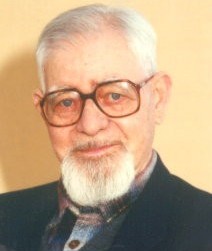Daniel Comboni
Comboni Missionaries
Institutional area
Other links
Newsletter
In Pace Christi
Orlando Antonino
Fr. Antonino Orlando was born in Palermo on 30 September, 1919. He was not yet two years old when his family moved to Savona, on the Liguria coast. In 1930, aged eleven, he entered the minor seminary at Brescia. He went to Venegono to do his novitiate and took first vows on 7 October, 1937. he studied philosophy and theology in Verona and was ordained priest on 27 June, 1943.
Having obtained a degree in Letters at the Catholic University of Milan, he continued all his life to study linguistics and the historical research he had begun during his stay in London (1948-1950), where he had been sent to study English in preparation for the mission.
His first assignment was to teach in our seminaries of Venegono and Rebbio from 1943 to 1947, as well as in Khartoum. In fact, immediately upon his arrival in Sudan on 25 July, 1950, he was sent to Comboni College where, for twelve years he dedicated himself to the great task of teaching.
In 1962, the Superior General, Fr. Gaetano Briani, aware of his competence and ability, decided to appoint him to the Comboni College in Asmara, where he was Rector for seven years. While he was in Eritrea, despite his busy schedule, Fr. Antonio added to his already vast knowledge of languages – Italian, Latin, Greek, French, English and Arabic – to include Tigray, Amharic and Ge’ez.
He continued to maintain contact with his old friends in Khartoum and he followed with interest and apprehension the news of the province and the complex Sudanese political affairs. He returned to Khartoum for the period from 1969 to 1972 and was at first mainly concerned with teaching at the Comboni College in Khartoum, but he was later appointed Rector of the Comboni College in Port Sudan. Fr. Antonino must have left his mark in Asmara, since the University made an urgent request for his services to the General Council. In 1973, in fact, he returned to Asmara to teach at the University, a new experience for him which motivated him deeply and remained always an ideal in his life, even if he had to teach in different periods. In August of 1977, he was sent again to the Comboni College of Port Sudan to help in an emergency and stayed there for three years, even though he made it known that he was tired after 35 years of active teaching and wanted to leave the secondary school as the work was so demanding.
In 1980, on his return from an extended holiday, he was assigned to the community of SS. Peter and Paul in Khartoum. This was the first time he ever worked outside the school environment: for three years he was in charge of the refugees at the Centre built for that purpose at St. Matthew’s Cathedral. Many of the refugees came from Ethiopia-Eritrea, an area that was itself in a complex political situation. Fr. Antonino, with his deep knowledge of the languages, was able to communicate easily with all. At the end of this period, Fr. Antonino felt somewhat worn out and only years later he spoke of a “long period of exhaustion”. As he left for his holidays in 1983, he asked to take part in the Renewal Course and felt the need of a long stay in Italy.
Fr. Salvatore Calvia, Superior General, invited him to stay some months in Rome at the Historical Archives and see what service he could render there. This was how Fr. Antonino happened to hold the post of General Archivist until the end of 1985, even though his heart was still in the mission.
In December 1985, Fr. Francesco Pierli, the new Superior General, again appointed him to Khartoum. Having returned to Sudan, he spent three years at Kosti, where he got along very well both with the confreres of the community and because he had only limited “though very gratifying” commitments, more in line with his need for more rest.
In 1989, during the holidays, he decided to stop for a month in Cairo to continue – at the Italian Cultural Centre – some research into the Meroitic language, a passion he managed to indulge at Kosti and which he never abandoned and made him an expert on the subject. We actually have some of his unedited writings on the mystery of this ancient Sudanese Kingdom and its language which, even today, remains largely undeciphered.
On returning to Khartoum after his holidays, he was assigned to the Provincial House as provincial secretary, librarian, provincial archivist and editor of the newsletter “Comboni Khartoum”. He was also superior of the community; as well as that he was helping the Nuncio once or twice a week and taught English at the diocesan seminary.
It was not long before Fr. Antonino again began to feel very weak and asked to be transferred to Italy for good. It was for this reason that the General Council regretfully assigned him, as from July 1991, to the Italian Province. In 2001 he became a member of the community of Rebbio for elderly, self-sufficient missionaries. He went for treatment to Milan, Rebbio and, finally, to Verona, where he died on 7 February, 2013, at the age of almost 94.
Da Mccj Bulletin n. 258 suppl. In Memoriam, gennaio 2014, pp. 17-25.

